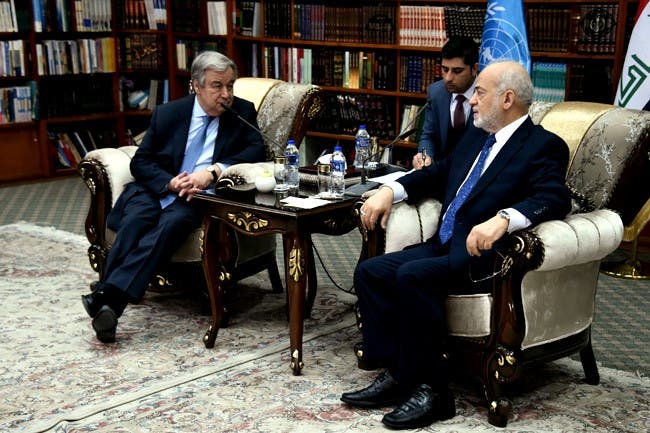BAGHDAD, March 30 (Xinhua) -- UN Secretary-General Antonio Guterres on Thursday visited Baghdad and met with top Iraqi officials to show support for the Iraq's fight against the Islamic State (IS) militant group, as the country is facing a growing humanitarian crisis following fierce battles in Mosul.
During his visit, Guterres held a meeting with Iraqi Prime Minister Haider al-Abadi. The two reviewed the humanitarian situation and the protection of civilians as the Iraqi forces are fighting to retake control of the western side of Mosul.
"The Iraqi people have proved their ability to defeat terrorism and to expel IS militants. We are in the final stage of liberating Mosul and our forces are exerting their utmost efforts to protect the civilians," Abadi said at a joint press conference with Guterres after their meeting.
Abadi accused IS militants of "intentionally using civilians as human shields, while intensifying their propaganda machine to spread rumors" that Iraqi forces and international aircraft caused casualties among civilians.
He also called on the United Nations and its Security Council to "issue a resolution to prosecute (IS) for its crimes against civilians."
Guterres expressed support for Iraq's efforts to liberate its territories from IS militants, saying that "our visit to Iraq is to show solidarity at a historic moment, and we hope to liberate Mosul and let normal life return soon."
Guterres also said that he was "extremely encouraged by the commitment that expressed by the Prime Minister Abadi about the protection of civilians during the military operations."
The UN chief asserted the need for the international community to provide relief efforts to about three million Iraqis who were displaced by clashes against the IS, which seized large areas in northern and western part of the country in 2014.
Guterres also met with Iraqi Foreign Minister Ibrahim al-Jaafari and the two sides reviewed "the humanitarian, security and political situations in Iraq as well as the victories of the Iraqi forces against IS," according to a statement by Jaafari's office.
Jaafari stressed on Iraq's call on the international organization to "adopt a draft to criminalize the terrorist ideology and fight extremism in order to protect the societies from the risk of recruiting their sons in terrorist groups," the statement said.
"Iraq needs a plan similar to Marshall Plan to assist the people of Iraq and to support development to overcome impacts of the war against terrorist gangs," the statement added.
The Marshall Plan was an initiative launched by the United States to aid Western Europe to recover from devastation after the World War II.
Guterres described his visit to Iraq as "historic" and confirmed that it comes to show solidarity with the Iraqi people in its war against terrorism, noting "the liberation of Mosul and the defeat of IS will contribute to support the unity of Iraq," according to the statement.
The UN chief pledged that the United Nations would increase its assistance to the displaced families, confirming that the international organization is working and assisting the Iraqi government in building and developing the country's institutions, it said.
During his visit, Guterres also met Iraqi President Fuad Masoum and the speaker of the parliament, Salim al-Jubouri, who expressed hope that the international organization would increase its humanitarian aid in Iraq.
The UN chief's visit came as the Iraqi security forces are fighting to dislodge the extremist IS militants from their last major stronghold in Mosul.
The troops have been fighting street by street and house by house to recapture the Mosul's old city center, but they were slowed by the heavy resistance of IS militants and the presence of some 500,000 people living in the old houses with narrow alleys.
The fierce battles in the western side of Mosul caused heavy casualties among civilians who were either caught by cross-fire or by airstrikes and shelling.
Mosul, 400 km north of the Iraqi capital of Baghdad, has been under IS control since June 2014, when government forces abandoned their posts and fled, enabling IS militants to take control of parts of Iraq's northern and western regions.
